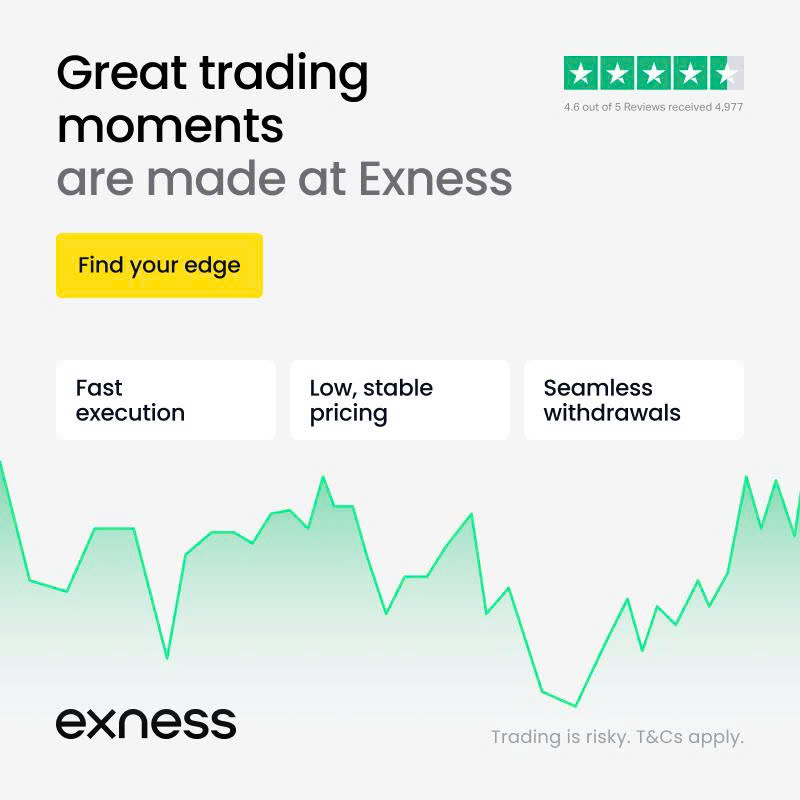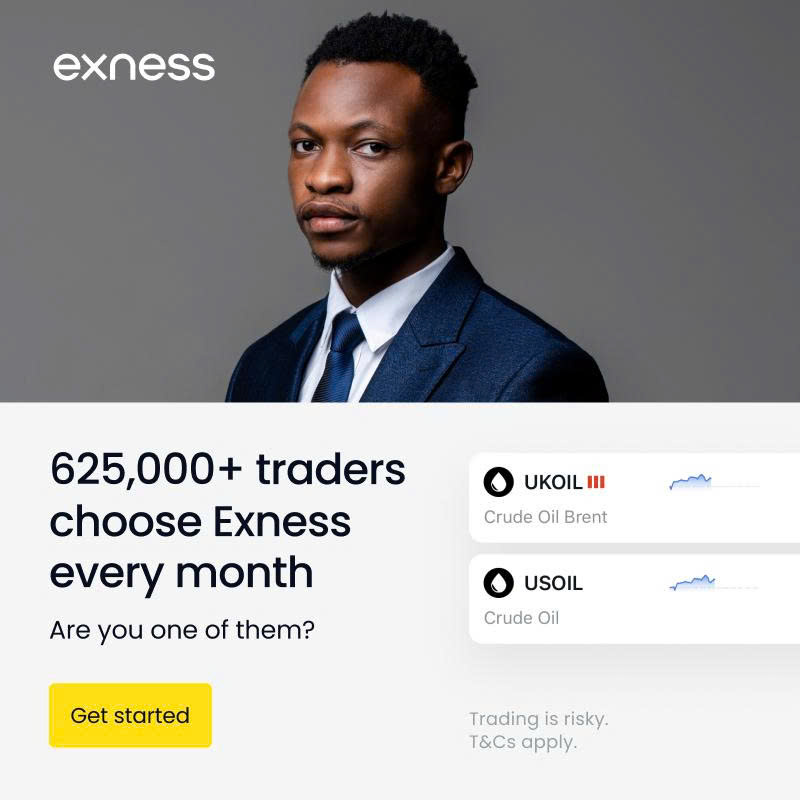
8 minute read
Exness vs Pocket Option: Which Broker Is Better?
from Exness
by Exness Blog
When choosing between Exness and Pocket Option, the decision boils down to your trading style, experience level, and goals. Exness is a top-tier forex and CFD broker, known for tight spreads and robust regulation, while Pocket Option shines as a beginner-friendly binary options platform with a low entry barrier. Both have unique strengths, but which one is right for you? In this guide, we’ll dive deep into their features, fees, platforms, and more to help you decide. Let’s get started!

✅ Trade with Exness now: Open An Account or Visit Brokers 👈
What Are Exness and Pocket Option?
Before we compare, let’s quickly break down what each platform offers.
Exness, established in 2008, is a globally recognized forex and CFD broker headquartered in Cyprus. It’s regulated by top-tier authorities like the FCA (UK) and CySEC (Cyprus), making it a trusted choice for traders who prioritize security. Exness offers trading on forex, commodities, cryptocurrencies, and indices through industry-standard platforms like MetaTrader 4 (MT4) and MetaTrader 5 (MT5). With a minimum deposit as low as $10, it’s accessible for beginners yet powerful enough for pros.
Pocket Option, launched in 2017, focuses on binary options trading. Based in St. Vincent and the Grenadines, it’s less regulated but appeals to traders with its simple interface and low $5 minimum deposit. Pocket Option offers over 100 assets, including forex, stocks, and cryptocurrencies, and is known for its gamified features like tournaments and social trading. It’s ideal for those seeking quick, high-risk, high-reward trades.
Now, let’s compare them head-to-head across key factors to see which platform fits your needs.
1. Trading Type: Forex & CFDs vs Binary Options
The biggest difference between Exness and Pocket Option is the type of trading they offer.
Exness: Specializes in forex and CFD trading. This means you’re trading on price movements of assets like currency pairs, metals, or stocks without owning them. CFDs allow for flexible strategies, including long-term trades and scalping, with leverage up to 1:2000 (depending on your region and account type). It’s suited for traders who want diversity and control over their positions.
Pocket Option: Focuses on binary options, where you predict whether an asset’s price will rise or fall within a short time frame (e.g., 1 minute to 4 hours). It’s simpler but riskier, as you either earn a fixed payout (up to 96%) or lose your stake. This makes it appealing for beginners or those who prefer fast-paced trading.
Which is better? If you’re into strategic, long-term trading with more flexibility, Exness is your go-to. If you want quick trades with straightforward outcomes, Pocket Option’s binary options might be more your style.
2. Regulation and Safety: Trust Matters
When you’re putting your money on the line, regulation is a big deal. Here’s how they stack up:
Exness: Highly regulated by trusted authorities like the FCA, CySEC, and FSCA (South Africa). These regulators enforce strict standards for fund protection, transparency, and fair practices. Exness also offers negative balance protection, so you can’t lose more than your deposit. This makes it a safer choice for risk-averse traders.
Pocket Option: Operates under less stringent oversight from the IFMRRC (International Financial Market Relations Regulation Center), which isn’t as robust as the FCA or CySEC. Some user reviews on platforms like Trustpilot raise concerns about withdrawal issues or account bans, though others report smooth experiences. The lack of top-tier regulation might be a red flag for cautious traders.
Verdict: Exness wins for safety and reliability, especially if you value strong regulatory oversight. Pocket Option is riskier but may still work for traders comfortable with offshore brokers.

✅ Trade with Exness now: Open An Account or Visit Brokers 👈
3. Minimum Deposit and Accessibility
Your budget plays a big role in choosing a platform. Both Exness and Pocket Option are beginner-friendly in this regard, but there are differences:
Exness: Offers a low minimum deposit of $10 for its Standard account, though Pro, Raw Spread, and Zero accounts require $200. This makes it accessible for most traders, with flexible account types for different experience levels.
Pocket Option: Starts at just $5, one of the lowest in the industry. This makes it incredibly appealing for new traders or those testing the waters with minimal risk. Demo accounts with $10,000 in virtual funds are also available for practice.
Who wins? Pocket Option takes the edge for its ultra-low entry point, but Exness isn’t far behind and offers more account flexibility.
4. Trading Platforms: Power vs Simplicity
The platform you trade on can make or break your experience. Let’s compare:
Exness: Uses MetaTrader 4 and MetaTrader 5, industry-standard platforms loved by traders for their advanced charting, automation (Expert Advisors), and customization. These platforms support complex strategies and are available on desktop, web, and mobile. Exness also has its own mobile app for quick access.
Pocket Option: Offers a proprietary platform designed for binary options. It’s intuitive, visually appealing, and easy to use, with features like real-time charts and social trading. However, it lacks the depth of MT4/MT5 and doesn’t support third-party platforms. It’s also available on mobile and desktop.
Which is better? Exness is ideal for traders who want powerful tools and flexibility, while Pocket Option’s simple interface suits beginners or those focused on binary options.
5. Fees and Costs: What’s the Real Price?
Fees can eat into your profits, so let’s break it down:
Exness: Known for competitive spreads, especially on its Raw Spread and Zero accounts (as low as 0.0 pips). Standard accounts have slightly higher spreads but no commissions. Deposits and withdrawals are mostly free, and there are no hidden fees. Swap-free (Islamic) accounts are available for all account types.
Pocket Option: Binary options don’t involve spreads or commissions in the traditional sense. Instead, you risk your entire stake on each trade, with payouts up to 96%. Deposits and withdrawals are generally low-cost, but some users report issues with crypto-only withdrawals in certain regions (e.g., no debit card support for UK banks).
Verdict: Exness offers better value for forex and CFD traders due to its low spreads and transparent fees. Pocket Option’s model is cost-effective for binary options but carries higher risk due to the all-or-nothing nature of trades.
6. Trading Instruments: Variety or Simplicity?
The assets you can trade are crucial for diversifying your portfolio.
Exness: Offers a wide range of instruments, including over 100 currency pairs, commodities (gold, oil), cryptocurrencies, indices, and stocks. This makes it versatile for traders who want to explore multiple markets.
Pocket Option: Provides over 100 assets, including forex, stocks, commodities, and cryptocurrencies. While the variety is decent, it’s tailored to binary options with short expiry times, limiting long-term strategies.
Who wins? Exness has the edge for its broader range and flexibility, but Pocket Option is sufficient for binary options traders.
7. Education and Support: Learning and Assistance
New traders need resources to grow, and experienced traders value responsive support.
Exness: Offers extensive educational resources, including webinars, tutorials, articles, and trading courses. Its customer support is available 24/7 via live chat, email, and phone, with fast response times.
Pocket Option: Provides basic tutorials and a blog but lacks the depth of platforms like Exness or eToro. Support is available via live chat and email, but some users report slower responses, especially during peak times.
Verdict: Exness is the clear winner for education and support, making it better for beginners and those seeking ongoing learning.
8. User Experience: Who’s It For?
Exness: Appeals to a wide audience, from beginners to advanced traders. Its MT4/MT5 platforms are powerful but may feel complex for newbies. The low minimum deposit and educational resources make it accessible, while high leverage and tight spreads attract pros.
Pocket Option: Designed for beginners and those who enjoy fast-paced, gamified trading. Features like social trading, tournaments, and a low $5 entry point make it fun and approachable, but the lack of regulation and limited platform depth may deter seasoned traders.
Which is better? Exness is more versatile, while Pocket Option is tailored for quick, beginner-friendly trades.
Pros and Cons: A Quick Recap
Exness Pros:
Strong regulation (FCA, CySEC)
Low spreads and transparent fees
Powerful MT4/MT5 platforms
Wide range of trading instruments
Extensive educational resources
Exness Cons:
Higher minimum deposit for advanced accounts ($200)
CFD trading can be complex for beginners
Pocket Option Pros:
Ultra-low $5 minimum deposit
Simple, beginner-friendly platform
Social trading and gamified features
High payout potential (up to 96%)
Pocket Option Cons:
Limited regulation (IFMRRC)
Risky binary options trading
Less robust educational resources
Final Verdict: Exness or Pocket Option?
So, which platform should you choose in 2025? It depends on your goals:
Choose Exness if you’re looking for a secure, regulated platform for forex and CFD trading. It’s perfect for traders who want flexibility, advanced tools, and a wide range of assets. Whether you’re a beginner or a pro, Exness’s low spreads, robust platforms, and educational resources make it a reliable choice.
Choose Pocket Option if you’re new to trading, have a small budget, or prefer the simplicity and excitement of binary options. Its low entry point, user-friendly interface, and social trading features are great for quick trades, but be cautious of the risks and lack of strong regulation.
Pro Tip: Try both platforms’ demo accounts to test their features without risking real money. Exness offers a free demo with MT4/MT5, while Pocket Option provides $10,000 in virtual funds. This hands-on approach will help you decide which platform feels right for you.
✅ Trade with Exness now: Open An Account or Visit Brokers 👈
Read more:

